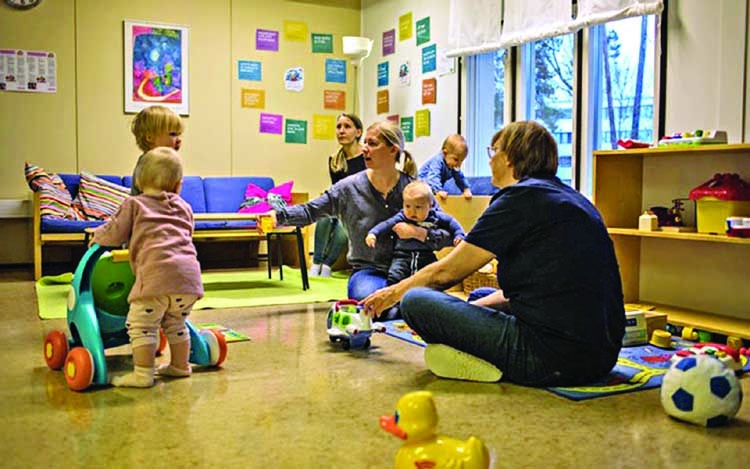Finland plans to give all new parents the same leave

Parents in Finland will be given the same amount of parental leave, regardless of their gender or whether they are a child's biological parents, the government announced.
The changes, which were announced Wednesday and could come into effect as early as 2021, are a bid to promote gender equality and inclusivity for same-sex couples and to encourage fathers to take as much time off work as mothers.
The measure is one of the latest reforms under Finland's new government, led by Sanna Marin, a progressive prime minister. Marin made news when she took up the post late last year, becoming the world's youngest premier and heading a coalition government made up of all female leaders.
Under the new reforms, each parent will be allowed 164 days of paid parental leave, which increased the total allowance for a couple from 11.5 months to more than 14 months, the government said in a statement.
Single parents will have the right to use the parental leave quotas of both parents.The minister of social affairs and health, Aino-Kaisa Pekonen, said that the new policy shows the government's "investment in the future of children" and in the well-being of families. "
The reform will be a major change in attitudes, as it will improve equality between parents and make the lives of diverse families easier," she added. But some industry and labour leaders seemed wary about the changes. Ilkka Oksala, director of work and social affairs of the Confederation of Finnish Industries, the largest employer's association in the country, criticised the new policy.
"The reform does not improve equality, it does not improve employment, and it does not improve women's position in the labour market," Oksala told Helsingin Sanomat, a Finnish daily newspaper.
Lotta Savinko, the head of labour affairs of Akava, a confederation of unions of professional and managerial staff in Finland, told the same newspaper that "the fact that the child home care allowance is not touched is a real problem."
Experts said that though the parental leave revisions had been long in the making, Marin may have been key to finally pushing the policy forward. "
Sanna Marin does represent change, and her values on politics and policies are in alignment with the new parental leave model," Elina Penttinen, a gender studies professor at the University of Helsinki, said over email Thursday.
Marin is a mother to a young daughter and has previously described herself as part of a "rainbow family." Her parents separated when she was a child, and she was raised by her mother and her mother's female partner. She has long been an advocate for progressive policies aimed at supporting families of all kinds.
Pekonen said that the reform will bring "a major change in attitudes" and "make the lives of diverse families easier.""The reform will support all kinds of families and ensure equal leaves for children regardless of the form of the family," she said.
The new government policy will apply to all parents, regardless of gender or whether they are a child's biological or adoptive parents, and parents can transfer up to 69 days of their own leave to their partner.
Many European governments have introduced their own measures to combat the continent's low birthrates by incentivising births, including Hungary, which recently announced plans to provide free in vitro fertilisation for married men and women at clinics run by the state.
But Finland is an outlier as it maintains that the changes are aimed at tackling gender inequality by abolishing gender-specific benefits and using gender-neutral language in the legislation.Many Finnish social media users applauded the government's efforts on social media after the measures were announced Wednesday.
"I never felt that family leaves are also for us rainbow families," Minna Minkkinen wrote in a tweet, pointing to the fact that the new reforms provide better inclusion of same-sex couples. "I was moved."
Hanna Markkanen said that it was a step toward a "family-friend Finland." "I'm particularly glad that multiple types of families are considered in the reform," she said.
Penttinen, the gender studies professor, said it had previously been "financially challenging for fathers to stay at home as they still received higher wages than women," but hoped that this reform would make way for improved work opportunities for women."In the long run, this might also change perception on hiring women as they have equal opportunity to advance their careers and return to work," she said.
The reform puts Finland well ahead of some other European countries in regards to the length of paternity leave. In Luxembourg, fathers can take just 10 days of paid leave "due to extraordinary circumstances," while in the Netherlands they are entitled to a total of five days, according to the European Parliament.
But Finland's parental leave policies are still not as generous as neighbouring Sweden, where each parent can take up to 240 days paid leave.The United States has yet to introduce federally mandated paid parental leave.
